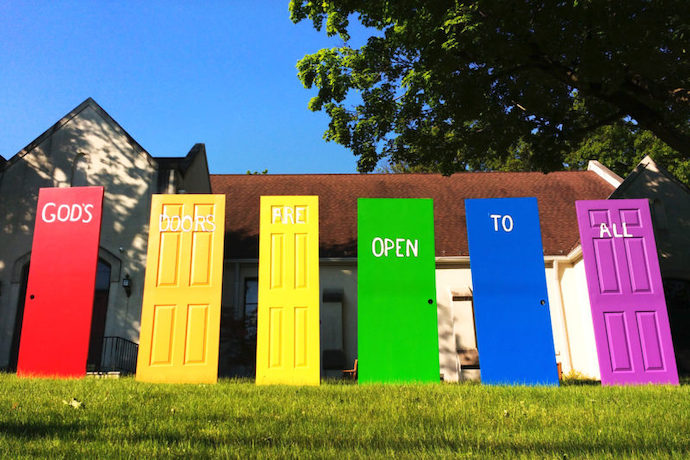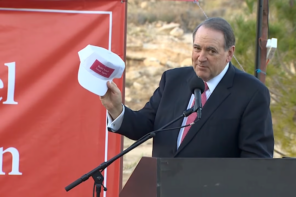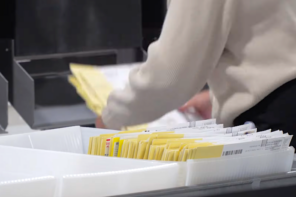As America reels from the exposure of a massive child sexual abuse scandal in the Southern Baptist Convention, recently uncovered by the Houston Chronicle and San Antonio Express-News, we should pause to take stock of the culpability of the broader conservative, mostly white evangelical subculture—not just churches in other evangelical denominations, but also educational institutions, parachurch ministries, parallel information and entertainment industries, and political lobbying organizations. As I have argued at RD and elsewhere, evangelicalism is essentially authoritarian, its defining doctrine of “biblical inerrancy” (or at least “infallibility”) serving to uphold a usually implicitly white supremacist—and usually explicitly patriarchal—theology and power structure.
Where inequality and the “right” to discrimination are defended as, respectively, “God’s will” and “religious freedom,” abuse—sexual, physical, spiritual, and emotional—prevails. And those in power cover it up in the name of protecting the reputation of a “man of God” or of “the Church’s witness,” often by calling abusive beliefs and practices “love,” while deftly maneuvering to reverse the roles of victim and oppressor as they carefully craft their public image in the press so that all too often the systemic problems go unaddressed.
In evangelical subculture, the indoctrination of children and converts into patriarchal authoritarianism fuels a cycle of abuse, the impact of which extends beyond evangelical subculture itself. The cycle in turn creates each new generation of evangelical culture warriors, like those currently enjoying immense power and influence under President Donald Trump. Evangelical K-12 schools and colleges have critical roles to play in this regard, and must also be subjected to serious scrutiny, not only as sites of discrimination, but as places where sexual abuse and assault often go unpunished.
On January 18 I inadvertently set off a media firestorm when I launched the #ExposeChristianSchools hashtag on Twitter in protest against Vice President Mike Pence and professional Christian pearl-clutcher David French crying foul over the perfectly valid criticism that resulted from the announcement that Second Lady Karen Pence was taking a job teaching art at an evangelical school that overtly discriminates against LGBTQ students, parents, and potential hires.
I myself am a queer alum of evangelical K-12 schools, and over the last few years I have been pursuing investigative journalism into the discriminatory practices of evangelical colleges and universities. I published my first exposé of evangelical colleges and universities with RD in early 2016, documenting a conservative crackdown in evangelical institutions, including Gordon College and Asbury University, that I associated with backlash against LGBTQ civil rights gains that were made during Barack Obama’s presidency. I noted that Gordon used a real financial crisis to purge faculty in a clearly targeted way, eliminating independent voices and faculty openly supportive of LGBTQ students. I also exposed censorship of the school newspaper at Asbury. All of these factors remain in play in other evangelical colleges and universities today, where alumni and unofficial student LGBTQ support groups, in cooperation with umbrella organizations like Soulforce and Brave Commons, continue to advocate for inclusion and equality despite long odds and frequent losses.
On February 7 I again highlighted the harsh realities faced by queer students at evangelical schools, the work of activists seeking to improve conditions, and the array of forces lined up against them in a new exposé for Political Research Associates, “The Struggle for LGBTQ Inclusion at Christian Colleges and Universities.” Here, I highlighted institutions including Clarks Summit University, Bob Jones University, and Cedarville University, in addition to exploring two major case studies where outcomes remain uncertain: Grove City College and Azusa Pacific University, both of which are interdenominational schools with pretensions to respectability. Since publishing this article, I have been in contact with members of the GCC and APU communities whose responses to my work were generally positive, but who also raised important concerns that I will address here, and that underscore the need for more investigative journalism covering evangelical schools.
Grove City College: “Unraveling the Layers”
According to class of 2011 GCC alum Eve (formerly known as Hännah) Ettinger, my recent coverage of GCC paints an overly rosy picture. “The more you unravel layers the more you see that going to GCC or working there is signing up to be complicit in the school’s discrimination against victims of sexual violence and against queer people.” Ettinger, now a freelance writer and graduate student at Hollins University, claims to be aware of multiple instances of sexual misconduct at GCC that have been swept under the rug (the victims have thus far chosen not to come forward), and it’s noteworthy that a former Grove employee was recently convicted of sexual abuse and invasion of privacy for recording video of male students in the shower and locker room
Jason Dauer, a gay class of 2017 GCC alum who played a leading role in confronting the administration over its choice of Mike Pence as his graduating class’s commencement speaker, likewise wanted to fill me in on certain facts. According to Dauer, who is currently pursuing his Master of Divinity at Pittsburgh Theological Seminary, my positive assessment of the lack of censorship of GCC’s student newspaper, The Collegian, is not entirely accurate. Dauer says, “The school newspaper has actually censored articles in the past,” claiming that in an article he wrote, the school removed a reference to a death threat an LGBTQ friend of his received in the campus mail. “There was also an article where quotations were completely removed from an affirming professor who had a rainbow sticker on his door.”
While Grove City College is one of the most accommodating evangelical colleges toward its LGBTQ student population, perhaps representing the pinnacle of what’s possible within an evangelical framework, I should clarify that this does not mean that the school is a safe or healthy place to be queer, or that it’s somehow exempt from the systemic problem of sexual misconduct that results from patriarchal ideology and norms. According to Ettinger, “The peer pressure at Grove does most of the heavy lifting for gaslighting students into silence. There’s no justice or true support for these students, just a culture of being quiet and toughing it out.”
Azusa Pacific University: Is a Faculty Purge Imminent?
A few days after I published “The Struggle for LGBTQ Inclusion,” an Azusa Pacific faculty member reached out to me with some disturbing information, encouraging me to publicize it, though requesting anonymity out of fear of retaliation from the university administration. Azusa Pacific does not offer its faculty tenure, but it uses a system of “term tenure” that includes the possibility for rank promotion and the chance to move from one-year to three-year, and ultimately to five-year, contracts. Even this term tenure appears to be on the chopping block. According to this faculty member, all faculty will soon be on one-year contracts, and faculty members’ stances on LGBTQ rights and affirmation are also being more closely policed. In their words, “It seems that now the board has decided we’re done being even marginally charitable or protective of faculty intellectual freedom.”
APU made headlines in the fall semester of 2018 for softening its stance on same-sex relationships, and then again when, in response to pressure from the evangelical establishment, it reversed the changes. Erin Green, a lesbian Christian postgraduate theology student, and an activist with Brave Commons, had worked to negotiate the changes with the administration, primarily through communication with APU Chaplain Kevin Mannoia. Mannoia, she says, ghosted her after the backlash in September that was organized in part by Associate Professor of Communication Studies Ryan Montague, whose role I exposed in my recent reporting. Green took it as a good sign when, in December, two of the board of trustees’ most conservative members resigned, indicating that it might be possible to again press for a more inclusive policy, but this now appears not to be the case. According to the anonymous faculty source, APU’s board members are motivated by dominionist politics, and “they are especially focused on queer people as a threat to their government funding.”
Meanwhile, APU began the 2018-2019 school year with a $17 million dollar cash flow shortfall, and in September 2018, Moody’s downgraded APU’s rating to Ba1, indicating that APU is “subject to substantial credit risk.” In addition, APU’s current president, Jon Wallace, plans to retire at the end of the current school year. Financial stress and a change of presidential administration are often the precursors for targeted faculty purges in evangelical institutions of higher education.
Green, with little recourse, is now working with current students on a campaign to challenge Azusa Pacific’s accreditation with the Western Association of Schools and Colleges, encouraging students to file complaints on the basis of administrative incompetence (for which the budget crisis provides evidence) and violation of its own policies. “One of the things we noticed,” Green says, “was that APU has an anti-harassment policy that does protect sexual orientation.” Her hope is not that APU will lose its accreditation, but that it will be forced to not only enforce the policy currently in place, but to adopt policies and practices that will better protect its LGBTQ students. Green believes that “the policy banning romanticized same-sex relationships could be considered a form of harassment,” and she claims to have documentation placing APU administrators on the record agreeing that the ban does indeed constitute harassment on the basis of sexual orientation.
Given the outsize influence that right-wing, anti-LGBTQ evangelicals have under Trump, it’s critical to keep efforts like Green’s in the public eye. Her struggle, and that of other students and alumni of evangelical educational institutions, whether they’ve remained connected to some form of Christianity like Green, or left it altogether, matters not just for the future of faith in America, but also for the future of American democracy.





